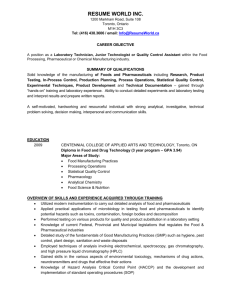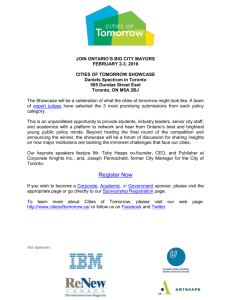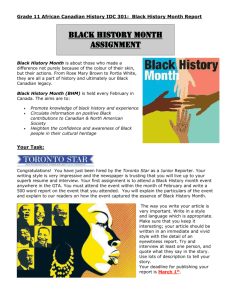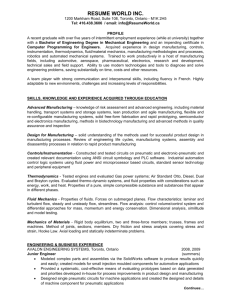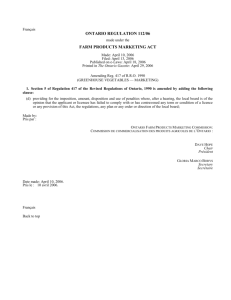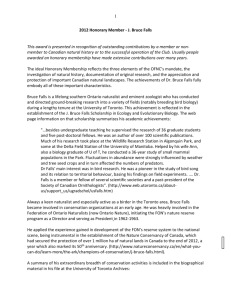BIOGRAPHY OF RAJ ANAND - University of Toronto Faculty of Law
advertisement
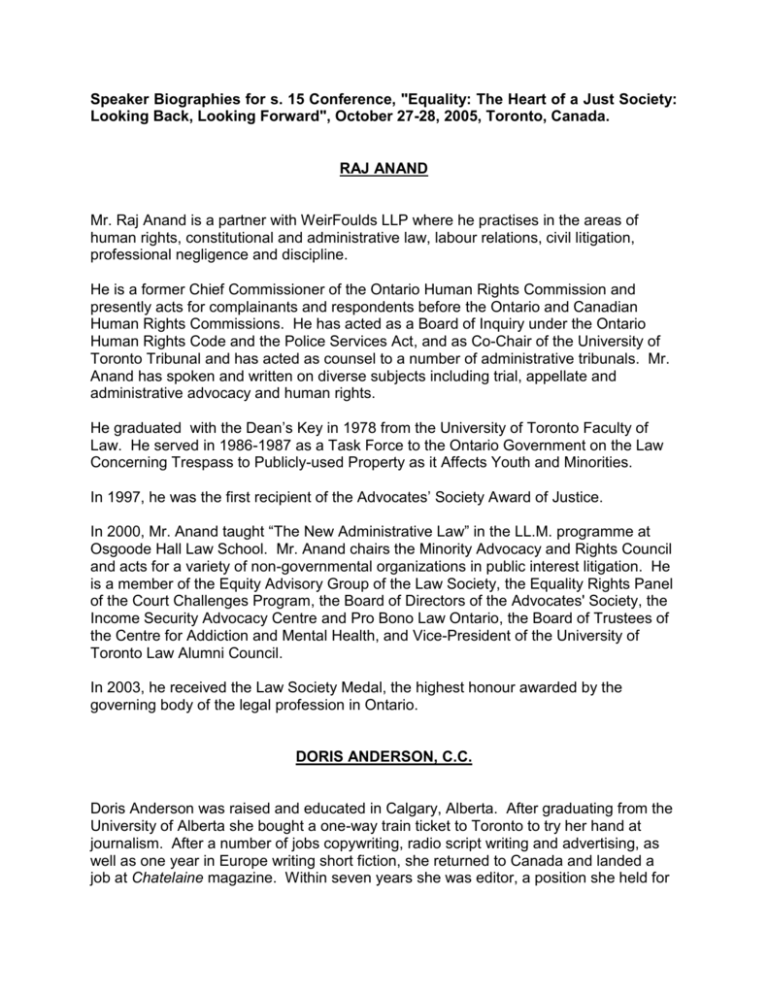
Speaker Biographies for s. 15 Conference, "Equality: The Heart of a Just Society: Looking Back, Looking Forward", October 27-28, 2005, Toronto, Canada. RAJ ANAND Mr. Raj Anand is a partner with WeirFoulds LLP where he practises in the areas of human rights, constitutional and administrative law, labour relations, civil litigation, professional negligence and discipline. He is a former Chief Commissioner of the Ontario Human Rights Commission and presently acts for complainants and respondents before the Ontario and Canadian Human Rights Commissions. He has acted as a Board of Inquiry under the Ontario Human Rights Code and the Police Services Act, and as Co-Chair of the University of Toronto Tribunal and has acted as counsel to a number of administrative tribunals. Mr. Anand has spoken and written on diverse subjects including trial, appellate and administrative advocacy and human rights. He graduated with the Dean’s Key in 1978 from the University of Toronto Faculty of Law. He served in 1986-1987 as a Task Force to the Ontario Government on the Law Concerning Trespass to Publicly-used Property as it Affects Youth and Minorities. In 1997, he was the first recipient of the Advocates’ Society Award of Justice. In 2000, Mr. Anand taught “The New Administrative Law” in the LL.M. programme at Osgoode Hall Law School. Mr. Anand chairs the Minority Advocacy and Rights Council and acts for a variety of non-governmental organizations in public interest litigation. He is a member of the Equity Advisory Group of the Law Society, the Equality Rights Panel of the Court Challenges Program, the Board of Directors of the Advocates' Society, the Income Security Advocacy Centre and Pro Bono Law Ontario, the Board of Trustees of the Centre for Addiction and Mental Health, and Vice-President of the University of Toronto Law Alumni Council. In 2003, he received the Law Society Medal, the highest honour awarded by the governing body of the legal profession in Ontario. DORIS ANDERSON, C.C. Doris Anderson was raised and educated in Calgary, Alberta. After graduating from the University of Alberta she bought a one-way train ticket to Toronto to try her hand at journalism. After a number of jobs copywriting, radio script writing and advertising, as well as one year in Europe writing short fiction, she returned to Canada and landed a job at Chatelaine magazine. Within seven years she was editor, a position she held for twenty years, during which she established Chatelaine as a leading voice for Canadian feminism – well in advance of comparable U.S. magazines. In 1979 she became President of the Canadian Advisory Council on the Status of Women in Ottawa. Her resignation in 1980 sparked what became known as the “Ad Hoc” conference and resulted in an entirely new clause in Canada’s Charter of Rights – Section 28 – confirming the equality of women and men in the Charter. From 1982 to 1984 she was president of the National Action Committee on the Status of Women, Canada’s largest volunteer lobby group, representing over 700 women’s organizations. For ten years she was a regular columnist for the Toronto Star. She is also the author of three novels and two non-fiction books, including her autobiography entitled “Rebel Daughter”. She has served on many boards and commissions including the National Conference on Confederation, the Canadian Institute on Public Affairs, the Canadian Film Development Corporation, the Board of Governors of York University, the board of Macmillan Publishing, Maclean-Hunter Publishing, the Metropolitan Children’s Aid Society, the Institute on Public Policy Planning, the North South Institute, Women’s College Hospital, the Judicial Council of Ontario, Harbourfront, as well as a founding member and president of Fair Vote Canada. She also served as Chancellor of the University of Prince Edward Island and is just completing a term as Chair of the Press Council of Ontario. She is a Companion of the Order of Canada, a member of the Order of Ontario, as well as the News Hall of Fame, a 1991 recipient of the Persons Award, the 1983 Y Awards for Women of Distinction, the Constance E. Hamilton Award for the City of Toronto and the Canadian Journalism Foundation’s Life Time Achievement Award. BEVERLEY BAINES Beverley Baines is a Professor in the Faculty of Law at Queen's University where she has taught Public Law, Constitutional Law, and Law Gender Equality. Currently she is the Head of the Department of Women's Studies in the Faculty of Arts & Science, as well as teaching Law and Public Policy in the School of Policy Studies. Her most recent book is The Gender of Constitutional Jurisprudence (Cambridge University Press, 2004), a study of women's constitutional equality jurisprudence in twelve countries, which she co-edited with Professor Ruth Rubio-Marin of the University of Seville. 2 Professor Baines was a constitutional advisor to women's groups seeking to entrench women's equality rights in the Charter in the early 1980s and has continued to take an avid interest in the Supreme Court of Canada's interpretation of these rights. THE HONOURABLE MICHAEL J. BRYANT Michael J. Bryant was elected to his midtown Toronto riding in 1999 and re-elected in 2003. Michael was appointed Attorney General of Ontario on October 23, 2003. He has also served as Ontario's first Minister Responsible for Democratic Renewal and Minister Responsible for Native Affairs. Michael previously served as opposition critic for the Attorney General and as energy co-critic. He also served on Ontario's Standing Committee on Justice and Social Policy. Prior to his election, Michael obtained a B.A. and M.A. at the University of British Columbia, an LL.B. at Osgoode Hall Law School, and an LL.M. at Harvard University. He clerked at the Supreme Court of Canada for the current Chief Justice of Canada and practiced litigation at McCarthy Tétrault in Toronto. Michael has also served as Lecturer in Law at King's College, University of London (U.K.) and as adjunct professor at Osgoode Hall Law School and the University of Toronto. He has published articles and books on public law and criminal law. Michael, his wife Susan Abramovitch, an entertainment lawyer, and their two children, live in midtown Toronto. THE RIGHT HONOURABLE JOE CLARK The Right Honourable Joe Clark was elected eight times to the House of Commons of Canada, and served in Parliament for 25 years, retiring in June 2004. He was Prime Minister of Canada in 1979-80, Secretary of State for External Affairs (Foreign Minister) from 1984-1991, Minister of Constitutional Affairs from 1991-1993, and Acting Minister of both National Defence and Justice. He served twice as Leader of Her Majesty’s Loyal Opposition, and as National Leader of the Progressive Conservative Party of Canada. He chaired the Canadian Cabinet committees on Foreign and Defence Policy, Security and Intelligence, the Free Trade Agreement with the USA, and the constitutional renewal process that led to the Charlottetown Accord. Internationally, he was the first chairman of the Commonwealth Committee of Foreign Ministers on Southern Africa, 3 which led the Commonwealth campaign against apartheid, chaired the first-ever joint meeting of members of NATO and the Warsaw Pact, and participated actively in eight G-8 (or G-7) Economic Summits. At his direction, Canada assumed its full role and responsibilities in the Organization of American States, recognized the Palestinian right to self-determination, and maintained ODA contributions at their highest levels in recent history. Mr. Clark was a founding board member of the Pacific Council on International Policy and, before returning to active politics in 1998, served on the boards of international NGOS and Canadian and international companies. He has been a visiting scholar at the University of California, Berkeley, and American University in Washington, DC, and was a Public Policy Scholar at the Woodrow Wilson International Center for Scholars in 2004. Mr. Clark is a member of the Council of Presidents and Prime Ministers of the Americas, and served as Special Representative of the Secretary-General for Cyprus. He is president of Joe Clark and Associates, an international consulting firm based in Canada, and active in Asia and Africa. He is author of the book “Canada: A Nation Too Good To Lose”. Mr. Clark is a Companion of the Order of Canada, a member of the Alberta Order of Excellence and l’Ordre de la Pleiades, and has been awarded several honourary degrees. He was the first recipient of the Vimy Award. Joe Clark is married to the Canadian author and lawyer Maureen McTeer, who specializes in law and public policy respecting health, science, and reproductive technologies. Their home is in Ottawa, Canada. THE HONOURABLE PETER CORY, C.C., C.D., Q.C. The Honourable Peter Cory was a pilot in the RCAF and served overseas with the 6th Bomber Group. The Honourable Peter Cory received a B.A. from the University of Western Ontario (Assumption) in 1947. He graduated from Osgoode Hall Law School in 1950. He was called to the Ontario Bar in 1950. He was appointed Q.C. in 1963. He practised law with Holden, Murdoch. He was elected a Bencher of the Law Society of Upper Canada in 1971. He was President of the Advocates’ Society; Chairman of the Ontario Civil Liberties Section of the Canadian Bar Association; President of the County of York Law Association; and a Director of the Canadian Bar Association. He was appointed as Chancellor of York University in June 2004. He was appointed to the Supreme Court of Ontario High Court in 1974; appointed to the Ontario Court of Appeal in 1981. He was appointed to the Supreme Court of Canada, February 1, 1989 and retired in June, 1999. 4 The Honourable Peter Cory is Honorary Colonel of 426 (T) Training Squadron and an Honorary Fellow of the American College of Trial Lawyers. The Honourable Peter Cory is currently mentoring at the Federal Department of Justice and conducting arbitration and mediation work at the Osler ADR Centre. Since 1999 the Honourable Peter Cory has been appointed and is continuing as a member of the DNA Data Bank Advisory Committee. He was appointed Commissioner for the Province of Ontario to conduct a study regarding paralegals. He was appointed Commissioner to study the qualifications, salary and pensions of Military Judges. He was appointed Commissioner by the Province of Manitoba to investigate the reasons for the wrongful conviction of Thomas Sophonow for murder and to fix the compensation payable to him arising from his wrongful conviction and imprisonment. He was recently appointed Commissioner by the governments of the United Kingdom and the Republic of Ireland to investigate and report with regard to six high profile murder cases which are significant to all the parties involved in the peace process in Northern Ireland. He recently completed a study for the Province of Ontario pertaining to the best method of auditing the medical service accounts of the doctors of the Province. MARY DAWSON, Q.C. Mary Dawson retired after a long career with the Government of Canada on June 23, 2005. As Associate Deputy Minister in the Department of Justice since 1988, she oversaw a wide variety of legal issues. Mrs. Dawson has throughout her career played an important role in relation to constitutional matters. She drafted the patriation package (Constitution Act, 1982) and has drafted, and provided the legal advice for, all Constitutional amendments since that time, including the Meech Lake Accord and the Charlottetown Accord. In recent years she led the legal team on the Quebec Secession Reference and was responsible for the legal advice on, and drafting of, the Clarity Act. She has advised extensively in the area of aboriginal rights throughout her career. Recently she managed the Supreme Court Reference on same sex marriage for the Department of Justice as well as the preparation of the draft legislation relating to same sex marriage. Mrs. Dawson was a Skelton-Clark Fellow at Queen’s University in 1999/2000 where she lectured in several faculties. She has also published several articles on various subjects. From 1986 to 1995, Mrs. Dawson was the head of the Department’s Public Law Sector, including the traditional public law areas of constitutional, administrative and international law as well as human rights law, native law, judicial affairs, access and privacy law and regulatory affairs. 5 She was Associate Chief Legislative Counsel from 1980 to 1986 and Chair of the Statute Revision Commission through most of the 1980’s. She joined the Legislation Section of the Department of Justice in 1970 and drafted such laws as the Access to Information Act, the Privacy Act, the Canada Health Act, the Official Languages Act, the Competition Act, the Customs Act and the Young Offenders Act. Mrs. Dawson has also been involved in a number of international activities as well as a number of outreach activities in Canada. She has held executive positions in the International Bar Association and was a Canadian member of the Joint Steering Committee of the Joint Canada-Russia project on Public Administration Reform in Russia. Mrs. Dawson holds a BA (Honours Philosophy) and a BCL (Civil Law) from McGill University, an LLB (Common Law) from Dalhousie University and a Diplôme d’études supérieures en droit (droit public), from the University of Ottawa. She is a member of the Quebec, Nova Scotia and Ontario Bars. MARY EBERTS Mary Eberts graduated from the University of Western Ontario and the Harvard Law School and is a member of the bar of Ontario. She is a partner at Eberts Symes Street Pinto & Jull, a Toronto firm; her litigiation practice includes equality cases at all levels of court and in many different jurisdictions in Canada. She was counsel to the Canadian Advisory Council on the Status of Women in 1981-82 in connection with the drafting of s. 15. A co-founder of the Women's Legal Education and Action Committee, she was the first chair of its National Legal Committee. She has received numerous awards for her equality work, including the Governor-General's Gold Medal in Honour of the Persons Cases. R. DOUGLAS ELLIOTT Douglas Elliott is a partner in the Toronto law firm of Roy Elliott Kim O’Connor LLP, where his practice includes plaintiffs’ and defendants’ class actions, as well as constitutional and human rights law. He received his LL.B. from the University of Toronto in 1982, and was called to the Bar in 1984. He was certified by the Law Society of Upper Canada as a Specialist in Civil Litigation in 2003. Douglas is perhaps best known for his work on high profile cases involving social justice issues. He represented the Canadian AIDS Society (CAS) at the Krever Inquiry into the blood system, and in interventions by CAS in the Supreme Court of Canada in Vriend v. Alberta, Latimer v. The Queen, Little Sisters Bookstore v. Canada and Hodge v. Canada. Douglas also acted as co-counsel for EGALE in its intervention at the 6 Supreme Court in Trinity Western University, and for the Foundation for Equal Families in M. v. H. Douglas was senior counsel representing the Metropolitan Community Church of Toronto in the Ontario same sex marriage case. Most recently, Douglas was the leader of a national team of lawyers who won a multimillion class action judgment for a group of gay and lesbian Canadians seeking CPP survivor’s pensions in Hislop v Canada. Douglas has been an active volunteer with his profession. He was the founding cochair of the Ontario Bar Association’s Sexual Orientation and Gender Identity Committee (SOGIC), and the Canadian Bar Association’s national SOGIC. He was cofounder and first president of the International Lesbian and Gay Law Association. Mr. Elliott has served on the Standing Committee on Equality of the CBA and the Law Society of Upper Canada’s Equity Advisory Group. He is currently on the Board of the Ontario Bar Assistance Plan. Douglas has been recognized with a number of awards, including the Leadership Award of the Canadian AIDS Society, the Founder’s Award from the Universal Fellowship of Metropolitan Community Churches, the Hero Award from the Canadian Bar Association’s Sexual Orientation and Gender Identity Conference, the “Lawyer of the Year” award from the Advocacy Resource Centre for the Handicapped and the Community Service Award from the Metropolitan Community Church of Toronto. ELIZABETH GOLDBERG Elizabeth Goldberg was Chief Constitutional Counsel with the Ministry of the Attorney General of Ontario from 1991 to 2005. She has advised the Government of Ontario on constitutional issues, including proposals respecting partriation, enactment of the Charter, and the Charlottetown Accord. She has also represented the Attorney General in all levels of court in cases involving fundamental issues of interpretation of the Charter. As Chief Constitutional Counsel her work included monitoring and coordinating all advice and representation in civil constitutional matters for the Ontario Government. She was a Trustee of the Law Foundation of Ontario from 1993 to 2002, a member of the Class Proceedings Committee from 2000 to 2004, and on the Board of Directors of the Ontario Justice Education Network from 2002 to 2005. She is on the Board of Directors of the Osgoode Society. She is currently Executive Lead of the Public Service Legislation Reform Project for the Government of Ontario. PETER W. HOGG, Q.C. Peter W. Hogg, C.C., Q.C., L.S.M., F.R.S.C., is scholar in residence at the law firm of Blake, Cassels & Graydon LLP. 7 He was the Dean of the Osgoode Hall Law School of York University from 1998 to 2003, and has been a professor at the Law School since 1970. He is the author of Constitutional Law of Canada (Carswell, 4th ed., 1997) and Liability of the Crown (Carswell, 3rd ed., 2000 with Patrick J. Monahan), as well as other books and articles. He has appeared as counsel in constitutional cases. THE HONOURABLE FRANK IACOBUCCI The Honourable Frank Iacobucci has had a varied career in private practice, academia, government and the judiciary. He was born, raised and educated in Vancouver, British Columbia, where he received his B. Comm. and LL.B. from the University of British Columbia. He went on to receive his LL.M. and Dip. Int’l L. from Cambridge. He began his career in 1964 as a lawyer at a large New York firm, where he practiced corporate and securities law. In 1967, he joined the Faculty of Law, University of Toronto, and was a Professor of Law there until 1985. He also served as Vice-President, Internal Affairs at the University of Toronto from 1975 to 1979 and Dean of the Faculty of Law from 1979 to 1983. From 1983 to 1985, he was Vice-President and Provost of the University. In 1985, Mr. Iacobucci was appointed Deputy Minister of Justice and Deputy Attorney General for Canada; in 1988, Chief Justice of the Federal Court of Canada; and in 1991, a Justice of the Supreme Court of Canada. The Honourable Frank Iacobucci retired from the Supreme Court of Canada in June 2004 and served as interim President of the University of Toronto from September 2004 until June 2005. On July 1, 2005, he joined Torys LLP as Counsel and became Chairman of Torstar Corporation. He has authored or co-authored numerous books, articles and commentaries on a variety of legal subjects. The Honourable Frank Iacobucci was recently given a mandate to lead, on behalf of the federal government, discussions toward a fair and lasting resolution of the legacy of Indian residential schools. JULIE JAI Julie Jai has been with the Ontario Regional Office, Justice Canada, since 2002, where she is the Director, Policy and Integration. From 1996 - 2002, Julie was Senior Counsel, Aboriginal Law with the Yukon Territorial Government, and worked on several successful land claim negotiations. She was Yukon’s Chief Negotiator in ground-breaking administration of justice negotiations with the Teslin Tlingit First Nation and the Government of Canada. 8 From 1982-1996, Julie served in a variety of capacities with the Ontario government. She was legal counsel to Correctional Services; to Citizenship and Culture; and to Financial Institutions; and an Intergovernmental Affairs Officer with the Ministry of Intergovernmental Affairs. Julie was also the Coordinator of French Language Services at the Ministry of the Attorney General; the Executive Coordinator, Justice Policy at Cabinet Office; and the Legal Director at the Ontario Native Affairs Secretariat. Julie received her LL.M in 2000 from the University of Toronto Law School and received the Deputy Minister of Justice’s Integration Award in 2005. She received her LL.B from Osgoode Hall Law School and B.A. from the University of Toronto. BRIAN LANGILLE Brian Langille is the Interim Dean, Faculty of Law, University of Toronto. He has held the positions of Professor of Law and Dean of the Graduate Program at the University. A native of Nova Scotia, he taught at Dalhousie Law School prior to joining the University of Toronto. His research and teaching interests include labour law, contract law and legal theory, all areas in which his numerous publications are focused. He has been a consultant to the Federal and Provincial governments on various labour issues and has been a member of Canadian delegations to the Governing Body and the International Labour Conference of the International Labour Organization. DAVID LEPOFSKY M. David Lepofsky, C.M., LL.B. (Osgoode) 1979, LL.M. (Harvard) 1982, LL.D. (Queen's) 1999, was admitted to the Ontario Bar in 1981. In 1980, David appeared before the Joint Committee of the Senate and House of Commons on the Constitution of Canada. On behalf of the Canadian National Institute for the Blind, he argued for s. 15 of the proposed Charter of Rights to be amended to include equality rights for persons with mental and physical disabilities. His efforts, along with those of others from the disability community, resulted in the Standing Committee making the amendment to s. 15 that was sought during a clause-by-clause debate over the Charter. From 1982 to 1988, he was counsel with the Crown Law Office (Civil) of the Ontario Ministry of the Attorney General. From 1988 to 1993, he was counsel with the Ministry's Constitutional Law & Policy Division where his practice focussed primarily on litigating a diverse range of constitutional issues at all levels of the Canadian court system, and advising the Ontario government on constitutional matters. He has lectured widely on various aspects of constitutional and administrative law. 9 Since November 1993, he has been with the Crown Law Office (Criminal), where he argues criminal appeals for the Provincial Crown at the Court of Appeal and Supreme Court of Canada levels. Mr. Lepofsky is the author of "Open Justice - the Constitutional Right to Attend and Speak About Criminal Proceedings in Canada," as well as a number of articles on constitutional and human rights topics. Since 1988, Mr. Lepofsky has been Associate Head of the Public Law Section of the Bar Admission Course. Mr. Lepofsky is the founding president of the Canadian Association for Visually Impaired Lawyers (CAVIL). MARILOU MCPHEDRAN Marilou grew up in Manitoba and graduated in 1976 from Osgoode Hall Law School. She has been a Member of the Order of Canada since 1985, in recognition of her leadership in the successful campaign to strengthen protection for women and girls in the Constitution through amending Section 15 on equality rights and adding the “Equal Rights Amendment” - Section 28 - which she helped to draft, as counsel to the Ad Hoc Committee of Canadian Women on the Constitution. Co-author of the 2004 textbook, Preventing Sexual Abuse of Patients – a legal guide for health professionals, she chaired Canada’s first inquiry into the sexual abuse of patients by doctors in 1991, on which major amendments to the Regulated Health Professions Act of Ontario were based, and chaired a second such task force resulting in the report What about Accountability to the Patient? - released in 2001. A dedicated volunteer, she is a co-founder of LEAF - the Women’s Legal Education and Action Fund, METRAC - the Metropolitan Action Committee on Violence Against Women and Children, and the Gerstein Crisis Centre for homeless discharged psychiatric patients. Specializing in creating and managing mechanisms to promote equity and diversity for Canadian and international clients in the public and private sectors, Marilou founded (at York University in 1997), and now co-directs, the International Women’s Rights Project at the University of Victoria. JANET E. MINOR Janet E. Minor is General Counsel in the Constitutional Law Branch of Ontario’s Ministry of the Attorney General. Called to the Bar in 1975, she has an LL.B. from the University of Toronto and an LL.M. from Osgoode Hall Law School. After two years of general litigation at the firm of Manning, Bruce, she joined the Ministry of the Attorney General in 1977. She has worked in public law since that time: first at the Crown Law Office Civil and since 1989, in the Constitutional Law Branch. A highly 10 respected advocate, Janet appears before all levels of Court and has argued many significant cases on behalf of the Ontario government. Janet is a member of a number of professional organizations and is a past Director of the Advocates’ Society, past Chair of the Sir William Campbell Foundation and past Executive Member of the Constitutional Law Section of the OBA. She is a founding member and former Director of the Association of Law Officers of the Crown. Janet was a Bencher of the LSUC from 2001-2003, serving on the Professional Development & Competence and Equity Committees. She currently sits on the University Tribunal and Discipline Appeals Board at the University of Toronto. Janet is a speaker and lecturer at numerous educational programs for the Ministry, Bar and public. Since 2004, she has taught Administrative Law as an adjunct professor at Osgoode Hall Law School. She received the 2003 President’s Award from the Women’s Law Association of Ontario. MAYO MORAN Professor Mayo Moran is an Associate Professor at the Faculty of Law, University of Toronto. She served as Associate Dean from January 2000 to June 2002. Professor Moran completed her LL.B. at McGill University and subsequently obtained an LL.M. from the University of Michigan and an S.J.D. from the University of Toronto. She has published in comparative constitutional law, private law, and legal and feminist theory. Her book Rethinking the Reasonable Person was published in 2003 by Oxford University Press. Professor Moran's work focuses on how our practices and theories of responsibility come to terms with discrimination. She is currently engaged in a project on reparations theory and transitional justice that examines the limits and possibilities of law, particularly private law, in redressing widespread historic wrongdoing. Professor Moran has worked on litigation involving the equality guarantee under the Charter and, most recently, the Chinese Canadian Head Tax claim. She teaches tort law, trusts, comparative constitutional equality and fault and responsibility. SOPHIA MOREAU Sophia (Reibetanz) Moreau is Assistant Professor of Law and Philosophy at the University of Toronto. She works in both legal theory and moral philosophy. Her current research in moral philosophy concerns the interpersonal nature of responsibility. Her current legal research aims to work out a general account of the nature and purpose of equality rights in the public and private sectors. Sophia has also been involved with L.E.A.F., and hopes to become more involved in the work of the Women's Court of Canada. 11 Prior to her appointment to the University of Toronto, Sophia clerked for Chief Justice Beverley McLachlin at the Supreme Court of Canada, in 2002-03. Before that, she completed her Ph.D. at Harvard University as a Frank Knox Memorial Fellow, and her B.Phil. at the University of Oxford, as a Commonwealth Scholar. She feels very fortunate to have had the chance to return to Canada to teach law, and to make Canada her intellectual and moral home. WILLIAM F. (BILL) PENTNEY Bill Pentney was named Senior Assistant Deputy Minister for the Policy Sector of the Department of Justice (DOJ) in May 2005. Bill has held a number of positions in DOJ, most recently as the Assistant Deputy Attorney General for the new Citizenship, Immigration and Public Safety Portfolio. From 1991 to July 1999 he was General Counsel and Director of Legal Services at the Canadian Human Rights Commission, and from 1983-89 he was a Professor in the Faculty of Law at the University of Ottawa. Mr. Pentney holds a B.A. from Queen’s University, and a Law degree and Master’s in Public Law from the University of Ottawa. Mr. Pentney is the author of several books and articles, including the revised edition of Justice Tarnopolsky’s text Discrimination and the Law in Canada, and Human Rights and Freedoms in Canada: Cases, Notes and Materials (with Mark Berlin). Mr. Pentney has represented the Canadian Human Rights Commission in human rights and equality cases in the Supreme Court of Canada, the Federal Court, and Provincial Courts of Appeal. DENISE RÉAUME Denise Réaume is Professor of Law at the Faculty of Law, University of Toronto, where she has taught since 1982. She completed her LL.B. at Queen's University in 1980 and the B.C.L. at Oxford (Balliol). She has been a visiting professor at the University of British Columbia, the University of Victoria (the Akitsiraq program) and the University of Saskatchewan. Her teaching interests include Torts and Discrimination Law. Her recent scholarship has been in the area of Charter equality rights, in particular rehabilitating the dignity aspect of the Law test. SVEND ROBINSON Svend Robinson was a New Democrat member of the House of Commons representing the Burnaby BC area for over twenty five years, from 1979 to 2004. He served on the Joint Committee on the Constitution of Canada in 1980-81, as well as on the Special Committee on Equality Rights in 1985, and many other Parliamentary committees over the years. Svend was particularly active on issues of human rights, the environment, 12 and peace and justice. He is currently working with the BC Government and Service Employees Union in their advocacy department. Svend lives in Burnaby with his partner Max and their two Havanese dogs. THE HONOURABLE ROY ROMANOW, P.C., O.C., Q.C. Roy Romanow was born, raised, and educated in Saskatoon. He graduated from the University of Saskatchewan where he earned his Arts and Law Degrees. He was first elected to the Saskatchewan Legislature in 1967. Between 1971 and 1982, Roy Romanow served as Deputy Premier of Saskatchewan. Throughout those 11 years, he also served as Saskatchewan's Attorney General, and was responsible for the introduction of a number of justice system reforms, including: the introduction of a provincial legal aid plan; the amalgamation of the District and Queen’s Bench courts; the creation of the Saskatchewan Human Rights Commission; the introduction of a Saskatchewan Human Rights Code; and the creation of the Provincial Ombudsman's Office. In 1979, Mr. Romanow was appointed Saskatchewan's Minister of Intergovernmental Affairs, and he was one of the key players in the federal-provincial negotiations that resulted in the Constitutional Accord and the Canadian Charter of Rights and Freedoms in 1982. In 1982, Mr. Romanow was appointed a Visiting Scholar at the University of Saskatchewan. During this period, he co-authored a book on the making of Canada’s new Constitution entitled, “Canada … Notwithstanding.” Mr. Romanow also served as a member on the Canadian Medical Association Task Force on the Allocation of Health Care Resources from 1983 to 1985. On November 7, 1987, Mr. Romanow was acclaimed Leader of the Saskatchewan New Democratic Party to succeed Allan Blakeney. On November 1, 1991, he was sworn in as Premier of Saskatchewan, a post he held until the spring of 2001, at which time he retired from active political life. During his time as Premier, his government balanced the provincial budget; placed the province’s fiscal position on solid footing; undertook large-scale reforms to healthcare, based on the premise of wellness and prevention; expanded and diversified the economic base of the province; and implemented new programs and funding for the Action Plan for Children, and the introduction of the Building Independence strategy to help move families off social assistance. Mr. Romanow was also an active participant in the negotiations leading up to the Charlottetown Accord of 1992. On April 4, 2001, Roy Romanow was appointed by Prime Minister Jean Chrétien to head the Royal Commission on the Future of Health Care in Canada. The 13 Commission's mandate was to recommend policies and measures to ensure the longterm sustainability of a universally accessible, high quality publicly-administered health care system for all Canadians. The Commission’s Final Report, entitled “Building On Values,” was released to the public on November 28, 2002. In early 2003, Mr. Romanow received the Economic Justice Award from the Atkinson Charitable Foundation of Toronto. He was also awarded honourary degrees from the University of Ottawa and Brock University. In the fall of 2003, Mr. Romanow was recognized by the Pan American Health Organization, receiving their Administration Award for his work on the Health Commission and his commitment to human rights and justice initiatives throughout his political career. In late 2003, Mr. Romanow was appointed to the Privy Council of Canada, and was named to the membership of the Security Intelligence Review Committee. Currently, Mr. Romanow holds the positions of Senior Fellow in Public Policy at the University of Saskatchewan and the University of Regina, and Visiting Fellow in the School of Policy Studies at Queen's University. THE HONOURABLE BARRY L. STRAYER, Q.C. The Honourable Barry l. Strayer, Q.C.,(formerly judge, Federal Court of Appeal and Chief Justice, Court Martial Appeal Court of Canada). University of Saskatchewan (B.A., 1953, LL.B., 1955); Oxford University (Bachelor of Civil Law-B.C.L. 1957) and Harvard University (Doctor of Juridical Science-S.J.D. 1966). Admitted to Saskatchewan Bar, 1959. Queen's Counsel (Canada) 1974. Attorney General's Department, Government of Saskatchewan, 1958-62. Professor of Law, College of Law, University of Saskatchewan, for 7 years. Director, Constitutional Review Section, Privy Council Office, Government of Canada, 1968-74. Assistant Deputy Minister of Justice 1974-83, responsible for the Public Law Branch. Constitutional Adviser to the Government of the Republic of Seychelles in 1979 for the purpose of assisting in the drafting of their new constitution. Involved in the constitutional reform process in Canada for over 22 years, first as an adviser to the Saskatchewan government and then to the Government of Canada. Also was much involved with human rights initiatives: an early adviser to the Government of Canada on a constitutional Charter of Rights; senior Justice official on development of the Canadian Human Rights Act, and on accession to the International Covenant on Civil and Political Rights. Appointed to the Federal Court of Canada - Trial Division in July, 1983; also appointed to the Court Martial Appeal Court of Canada, November, 1983; and to the Federal Court of Appeal, August, 1994. Appointed Chief Justice, Court Martial Appeal Court of Canada, December, 1994. Member, Competition Tribunal, 1986-93. Served on loan from Canada as consultant to the Government of Hong Kong October-December, 1989 14 on the drafting and implementation of a Bill of Rights. Chairman, Administrative Law Committee, International Bar Association, 1990-93. Member, Canadian Judicial Council, 1996-2004. President, Commonwealth Human Ecology Council, Canadian Section, 1995. Retired from judicial positions on May 1, 2004. Author of The Canadian Constitution and the Courts (3rd ed. Butterworths, 1988), The Patriation and Legitimacy of the Canadian Constitution (U. of Sask., 1982 - Cronkite Lectures) and numerous periodical articles on public law subjects. LORRAINE E. WEINRIB Lorraine E. Weinrib is Professor of Law, University of Toronto, cross-appointed to the Dept. of Political Science. As Crown Law Officer and later Deputy Director of Constitutional Law and Policy (Ontario), she worked on the adoption of the Canadian Charter of Rights and Freedoms, 1982 and its integration into the Canadian legal system, including litigation at the Supreme Court of Canada. Publications include studies of the Charter’s conceptual coherence and institutional legitimacy as well as its influence on other rights protecting systems. Professor Weinrib has published widely on the Charter’s advent, on constitutional litigation, comparative constitutional law and history, interpretation and theory as well as on particular topics, such as hate speech, abortion, assisted suicide, equality and institutional role (s. 1 and 33). Visiting professor: Michigan, Hebrew University, Witwatersrand, Johannesburg and Tel Aviv. 15
